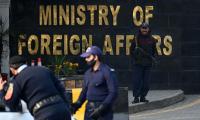Proposed Pak-Turkey FTA
ISLAMABAD: Pakistan should seek tariff reduction on high potential export products as well as cut in custom duties on machinery and raw material imports in the final negotiations on Pak-Turkey free trade agreement, a senior business analyst said on Thursday.
Ameen Jan, ex-management consultant at McKinsey & Company said trade should spur national economic growth, “but so far FTAs (free trade agreements) do not appear to be connected to the economic growth agenda.”
“One reason for the increase in trade deficit is poor negotiation… for example, in the FTA with China many of Pakistan’s leading exportable items were given lower concessions than Pakistan’s competitors from ASEAN (Association of Southeast Asian Nations), which worsened our competitive position,” Jan told a select group of journalists.
“Sadly, recent free trade agreements with China and Malaysia have resulted in worsening the trade balance for Pakistan,” he said.
Pakistan and Turkey have so far held six rounds of FTA’s talks. The final round is expected by the end of the current month.
The analyst said trade managers are signing FTAs without proper homework, resulting into yawning trade deficit and causing losses to precious foreign exchange reserves. Local diaper industry is asking the government to provide concessions on raw materials at import stage and inclusion of finished products in the negative list for upcoming Pak-Turkey FTA negotiations.
“The reason behind this wish is to support Pakistan’s manufacturing base and reduce trade deficit,” Jan said. He said lower concessions in advantageous products (e.g. cotton, apparel, footwear) and higher concessions in disadvantageous products (manmade fibers, machinery, metals) are also among the reasons.
He added that infant industry might not develop if trade concessions are not carefully targeted, and as a result government’s revenues may also be reduced because of a loss in sales tax paid on domestic manufactured products.
The analyst said the country’s economic priority should be to strengthen its manufacturing base for value-added products, which can also find export markets. The proposed FTA should ensure that domestic industry gets strengthened, through reducing raw material and machinery import costs instead of cutting customs duties on value-added products that Pakistan can produce at a globally competitive cost and quality, he added.
Jan gave an example of Ontex Pakistan as a case study. Ontex Pakistan is a subsidiary of Ontex Global that manufactures and sells baby diapers in Pakistan with a brand name of Canbebe. It started local operation by importing and selling products from Turkey in 2011. In 2012, it invested in a manufacturing plant at Port Qasim and now it has three production lines with over 200 employees, making baby diapers at global quality standard.
The total investment to date in the plant and working capital by Ontex in Pakistan is $18 million, and its annual tax paid to the government is more than Rs700 million. With its local plant close to meeting domestic demand, Ontex now plans to export products to regional markets from 2017 onward.
“Ontex is an example of how foreign direct investment can be to Pakistan’s benefit,” Jan said. “This type of FDI has created local jobs and generated taxes for the government. It has also created a growing manufacturing hub whose products are at a global quality level capable of being exported to regional markets.”
He said Pak-Turkey FTA should ensure that foreign investors like Ontex are supported through reduction of customs duties on raw material imports from Turkey, and not through reduction in the duty structure on finished goods which they are able to manufacture in Pakistan. “This will provide an incentive to companies like Ontex to continue manufacturing in Pakistan, rather than importing the same finished goods from their plants in Turkey under reduced tariffs.” —Mehtab Haider
In this picture, the PCJCCI logo can be seen on September 1, 2022. — Facebook/Pakistan China Joint Chamber of...
A representational image of a US flag pictured alongside a street sign reading "Wall Street" in the New York city. —...
A security guard sits in front of a wall with signs and slogans at the operation building at the Pakistan Steel Mills ...
A worker cleans the entrance to the headquarters of Bank Indonesia, the nation's central bank, in Jakarta, Indonesia....
The MCB's logo is seen on a wall outside the bank's head office. — MCB websiteKARACHI: MCB Bank Limited on...
A foreign currency dealer counts US dollars at a shop in Karachi. — AFP/FileKARACHI: The rupee lost ground against...







